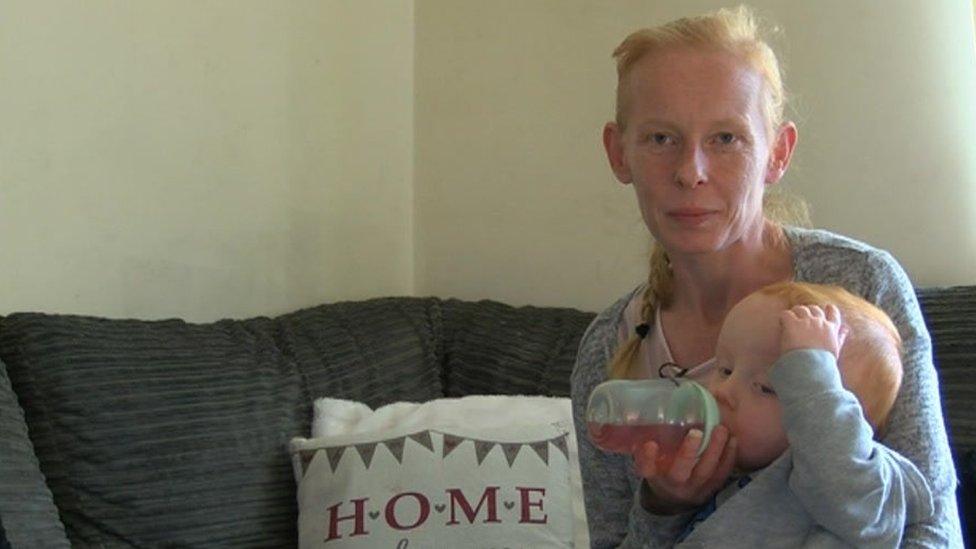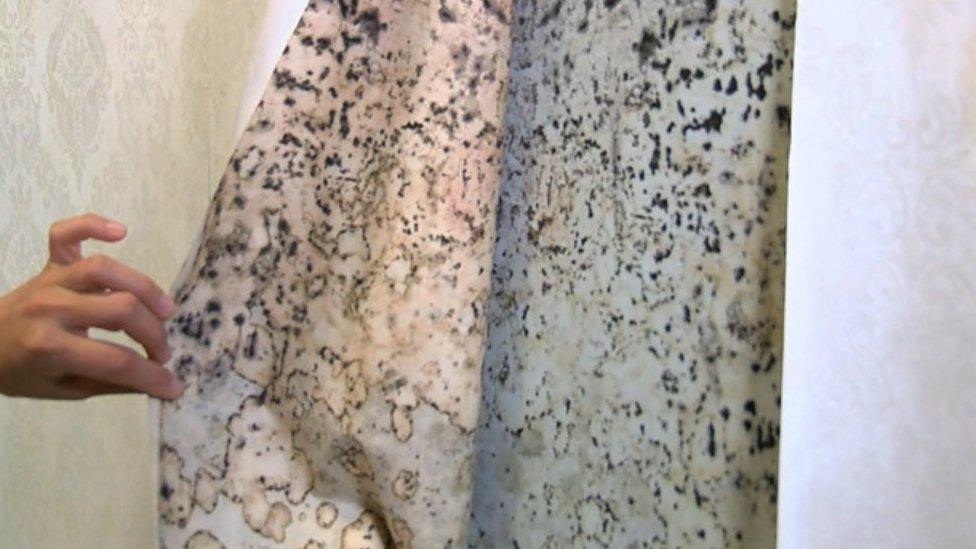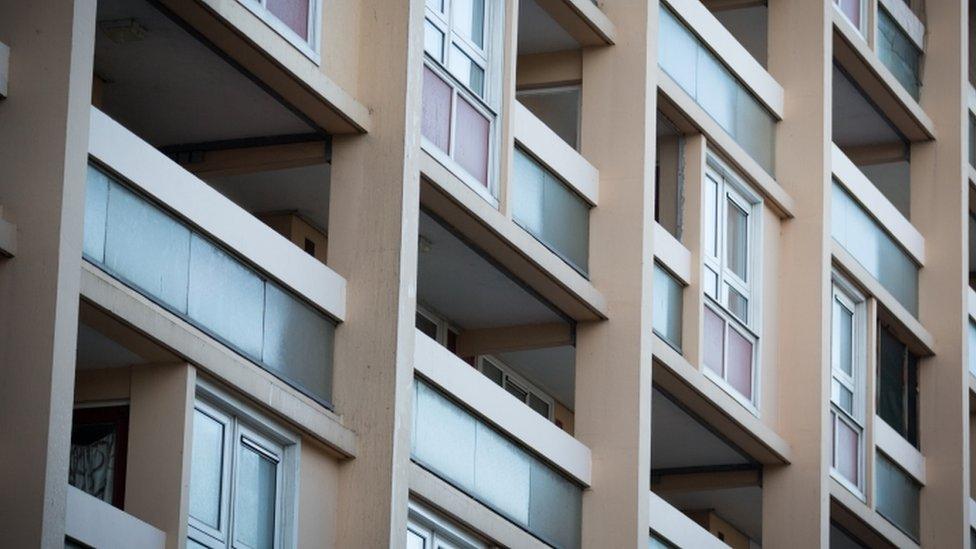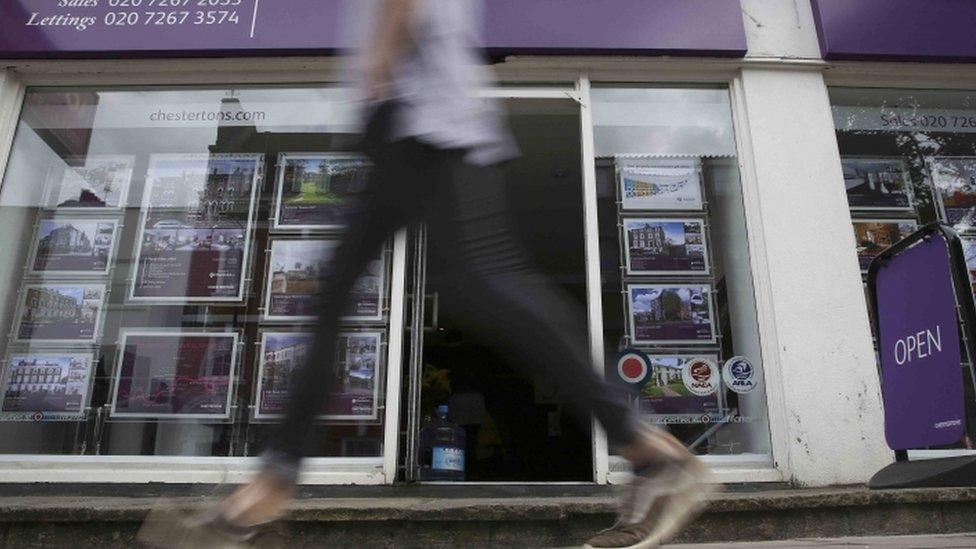'Unfit' council home 'made my children ill'
- Published
Nearly 11,000 disrepair claims have been brought over issues such as damp and leaks
Nearly 11,000 tenants have claimed compensation for damp, leaks and damage in their council homes.
Local authorities in England have paid out more than £35m in compensation and legal fees in the past five years to people living in "unfit" homes.
The number of "disrepair" claims has risen despite a two-thirds fall in the number of "unfit" homes since 2011.
One tenant described how her children developed breathing problems from damp conditions.

Ann Asquith says her son has developed breathing problems because of the damp that exists in her council home

An investigation by BBC Yorkshire found tenants living in council homes in Leeds with rising damp and other major disrepair issues
Ann Asquith took Leeds City Council to court claiming the authority had failed to adequately maintain the home she was renting from them.
She said: "The damp in this house is ridiculous, we've got holes in the walls upstairs in the bathroom and we've got kitchen units falling off the wall.
"I've got two children both who have developed breathing problems because they've had to live in such a damp house."
The Local Government Association (LGA) said councils were doing a "great job in difficult circumstances".
It said the number of "unfit" homes had "plummeted" in recent years following investment in council housing, despite cuts in funding.
In 2011 there were 217,000 "non-decent" council homes, according to official statistics. By 2016 this had fallen to 80,000.
However, the number of disrepair claims has gone up, from 1,694 in 2011-12 to 2,440 in 2015-16.
Lawyers say council tenants are becoming more aware of their rights.
'Not about money'
Councils often find themselves paying out more in legal fees than they do in compensation, as local authorities are often told they have to pay the legal costs of both parties should they lose the case.
For example, Birmingham City Council paid out £200,000 in compensation to tenants over the last five years but spent an additional £1.5m on legal costs.
Nina Patel, from Jackson Canter Solicitors, rejects the idea that lawyers are cashing in on the problem.
"This is not about money and profit, it's about the condition of the properties being rented out by councils," she said.
"Councils are very quick to charge rents and evict our clients if they fall behind with their payments, so equally why can't these tenants go and get legal advice if the repairs they are asking to be done aren't being carried out?"

Lawyer Nina Patel says more council tenants are now becoming aware of their rights and how they can claim compensation
Leeds City Council said that in the year 2015-16 it resolved 440 claims for disrepair, primarily relating to damp, equivalent to less than 1% of its total housing stock.
A spokesperson said: "The age and character of the council's homes does make it difficult to avoid damp but we have invested more than £76m over the last five years in measures specifically designed to tackle the issue.
"However, from time to time there are instances of damp disrepair and when this does occur, the council endeavours to respond effectively and efficiently to repair requests from its tenants."
Anyone who rents a home in England can bring a claim against their landlord if they believe they have failed to undertake basic repairs to key aspects of the property, such as the exterior walls, roof or electrics and plumbing.
When a tenant rents a property directly from a local council, the authority is responsible for carrying out these basic repairs.
BBC News sent Freedom of Information requests to all 325 councils in England and 86% responded, with the data showing that the number of disrepair claims being made has been steadily increasing.
In total 10,930 disrepair claims have been brought against local authorities since 2011-12.
About one in every 20 homes in England is still rented directly from a local council, with the latest government figures, external showing there are 1.6m council properties still in existence.
However, half of the councils that responded to the BBC's request for information said they had transferred their housing stock to a housing association or arms-length company.
Seventy-five local authorities disclosed they had paid out money to deal with disrepair claims totalling £35.4m.
Southwark and Lambeth Councils paid out the most in compensation and legal costs since 2011-12, with both authorities paying out more than £10m each.
Local authorities across England have faced sustained cuts to their overall budgets in recent years.
However, the latest local government budget data, external shows that the amount earmarked for maintaining and repairing council properties has remained relatively stable at about £1.7bn a year.
Councillor Martin Tett, LGA housing spokesman, said the number of 'non-decent' council homes had "plummeted" from 746,000 in 2006 to 80,000 in 2016.
"This is a 90% drop and shows councils are doing a great job in difficult circumstances to ensure homes are at a decent standard."
He added: "Councils desperately need the powers and access to funding to improve existing housing stock, replace homes and reinvest in building more of the genuine affordable homes our communities desperately need."
A spokesman for the Department for Communities and Local Government said: "The government is clear that all council and housing associations should provide a decent standard of homes and ensure they are in a good state of repair."
Additional reporting by Anna Crossley and Nicola Hudson
- Published4 October 2016

- Published22 October 2016

- Published17 October 2016
